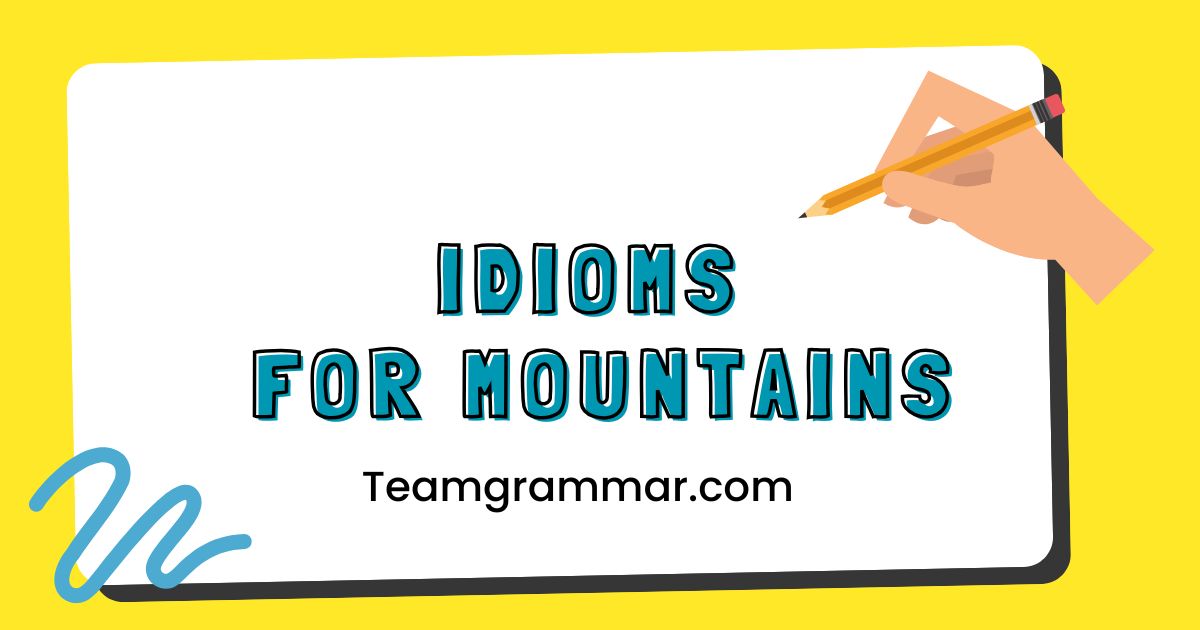37 Mountain Idioms: Mastering Figurative Language in English
Idioms enrich the English language, adding color and depth to our communication. Mountain idioms, in particular, draw on the powerful imagery of mountains to convey a range of meanings, from overcoming challenges to achieving goals.
Understanding and using these idioms effectively can significantly enhance your English proficiency, making your speech and writing more expressive and engaging. This article is designed for English language learners of all levels, from beginners seeking to expand their vocabulary to advanced speakers aiming to refine their command of figurative language.
By exploring the definitions, structures, and usage of mountain idioms, you will gain a valuable tool for navigating the nuances of English communication and expressing yourself with greater precision and flair.
Table of Contents
- Introduction
- Definition of Idioms for Mountains
- Structural Breakdown
- Types or Categories of Mountain Idioms
- Examples of Mountain Idioms
- Usage Rules for Mountain Idioms
- Common Mistakes with Mountain Idioms
- Practice Exercises
- Advanced Topics
- FAQ Section
- Conclusion
Definition of Idioms for Mountains
An idiom is a phrase or expression whose meaning cannot be understood from the literal meanings of its individual words. Instead, idioms rely on a figurative or symbolic interpretation that has developed over time through cultural usage.
Mountain idioms are a subset of these expressions that use the imagery of mountains – their height, grandeur, and the challenges they present – to convey abstract ideas and concepts.
Mountain idioms are classified asfigurative language, falling under the broader category ofmetaphorical expressions. They function as a way to communicate complex ideas in a concise and memorable way, often adding emotional weight or emphasizing a particular aspect of a situation.
The context in which a mountain idiom is used is crucial for understanding its intended meaning. These idioms are frequently used in both spoken and written English, appearing in everyday conversations, literature, and professional communication.
Classification of Idioms
Idioms can be classified based on their structure, function, and meaning. Some common classifications include:
- Verbal idioms: These idioms contain a verb and often an object or prepositional phrase (e.g., move mountains).
- Prepositional idioms: These idioms contain a preposition and a noun or pronoun (e.g., over the hill).
- Binomial idioms: These idioms consist of two words or phrases joined by a conjunction (e.g., hills and valleys).
- Cliché idioms: These are overused idioms that have become commonplace (e.g., at the top of the mountain).
Function of Idioms
Idioms serve various functions in communication, including:
- Adding emphasis: Idioms can emphasize a particular point or feeling.
- Creating imagery: They can create vivid mental pictures for the listener or reader.
- Expressing complex ideas concisely: Idioms can convey complicated concepts in a few words.
- Establishing rapport: Using idioms correctly can show cultural understanding and build connections with others.
Contexts of Use
Mountain idioms are used in a variety of contexts, including:
- Everyday conversation: To add color and expressiveness to casual speech.
- Business communication: To convey strategic goals or challenges.
- Literature and journalism: To enhance storytelling and create emotional impact.
- Motivational speaking: To inspire and encourage listeners.
Structural Breakdown
Mountain idioms, like all idioms, do not adhere to standard grammatical rules when interpreted literally. Instead, their meaning is derived from the combined effect of the words within the idiom.
Understanding the structure of these idioms involves recognizing the common patterns and components that contribute to their figurative meaning. The key is to look beyond the individual words and focus on the idiom as a whole unit of meaning.
Many mountain idioms utilize verbs related to climbing, ascending, or overcoming obstacles. Nouns often include “mountain,” “hill,” “peak,” or related terms suggesting height or difficulty.
Prepositions like “over,” “up,” or “down” can also play a crucial role in conveying the direction or status of the action or situation described by the idiom.
Common Structural Patterns
Here are some common structural patterns found in mountain idioms:
- Verb + Mountain/Hill/Peak: Climb a mountain, scale a peak, move mountains.
- Preposition + Mountain/Hill/Peak: Over the hill, at the foot of the mountain, on top of the mountain.
- Adjective + Mountain/Hill/Peak: An uphill battle, a mountainous task.
Grammatical Elements
The grammatical elements within mountain idioms contribute to their overall meaning. These elements include:
- Nouns: Represent the mountain or its features (e.g., mountain, peak, summit).
- Verbs: Describe actions related to mountains (e.g., climb, scale, descend).
- Adjectives: Modify the nouns to further describe the mountain (e.g., high, steep, rocky).
- Prepositions: Indicate the relationship between the elements (e.g., on, over, under).
Types or Categories of Mountain Idioms
Mountain idioms can be categorized based on the specific aspect of mountains they emphasize or the type of meaning they convey. This categorization helps in understanding the nuances of each idiom and using them appropriately in different contexts.
Some common categories include idioms related to overcoming challenges, achieving goals, aging, and perspective.
Idioms Related to Overcoming Challenges
These idioms describe situations that require significant effort, perseverance, and determination. They often evoke the image of climbing a steep or difficult mountain, symbolizing the obstacles that must be overcome.
Idioms Related to Achieving Goals
These idioms focus on the successful completion of a task or the attainment of a desired outcome. They often use the imagery of reaching the summit of a mountain to represent the achievement of a goal.
Idioms Related to Aging
These idioms relate to the process of getting older, often using the metaphor of going “over the hill” to describe the decline in physical or mental abilities associated with aging.
Idioms Related to Perspective
These idioms use the vantage point from a mountain to describe a broader or more insightful view of a situation or issue. They often suggest a sense of detachment or objectivity.
Examples of Mountain Idioms
This section provides a comprehensive list of mountain idioms, organized by category, with examples of their usage in sentences. Understanding these examples will help you grasp the meaning of each idiom and use them correctly in your own speech and writing.
Each table includes a variety of idioms with diverse meanings and applications.
Examples: Overcoming Challenges
The following table provides examples of idioms related to overcoming challenges, with their meanings and example sentences. These idioms often describe situations that require significant effort and determination.
| Idiom | Meaning | Example Sentence |
|---|---|---|
| Move mountains | To accomplish something that seems impossible | She had to move mountains to get the project approved on time. |
| An uphill battle | A difficult and prolonged struggle | Trying to change the company’s policies was an uphill battle. |
| Climb a mountain | To overcome a significant challenge | Starting a new business is like climbing a mountain; it requires a lot of effort. |
| Scale a peak | To achieve a high level of success or overcome a major obstacle | After years of hard work, he finally scaled the peak of his career. |
| A mountain to climb | A major challenge or obstacle to overcome | Getting the funding for the project will be a mountain to climb. |
| Against the grain | Doing something that is not natural or normal, often involving resistance | He went against the grain when he decided to quit his stable job to pursue his passion. |
| Swim upstream | To go against the prevailing opinion or trend | She felt like she was swimming upstream when she argued for a different approach. |
| Paddle one’s own canoe | To be independent and self-reliant, especially in difficult situations | After losing his job, he had to paddle his own canoe and find a new way to make a living. |
| Face the music | To confront the consequences of one’s actions, often unpleasant | He knew he had to face the music after making a serious mistake at work. |
| Bite the bullet | To endure a painful or unpleasant situation with courage | She had to bite the bullet and accept the harsh criticism to improve her performance. |
| Weather the storm | To survive a difficult period or crisis | The company managed to weather the storm despite the economic downturn. |
| Rise to the occasion | To perform well in a difficult or unexpected situation | He rose to the occasion and delivered an outstanding presentation despite his nervousness. |
| Go the extra mile | To make more effort than is expected or required | She always goes the extra mile to ensure her clients are satisfied. |
| Push the envelope | To exceed the limits of what is normally done or accepted | The company is known for pushing the envelope with its innovative products. |
| Take the bull by the horns | To confront a difficult situation directly and with courage | He decided to take the bull by the horns and address the issue head-on. |
| Hang in there | To persevere and not give up, especially in a difficult situation | Hang in there; things will get better soon. |
| Keep your chin up | To remain cheerful and optimistic despite difficulties | Keep your chin up; you’ll find a new job soon. |
| Never say die | To never give up, even when things are difficult | He never says die and always finds a way to overcome challenges. |
| When the going gets tough, the tough get going | Resilient people become more determined when faced with difficulties | When the going gets tough, the tough get going, and that’s exactly what she did. |
| Through thick and thin | Through good times and bad times | They supported each other through thick and thin. |
| Against all odds | Despite seemingly insurmountable obstacles | He succeeded against all odds. |
| Brave the storm | To face a difficult or dangerous situation with courage | We must brave the storm and continue our work. |
| Hold the fort | To take responsibility for something while someone else is away | Can you hold the fort while I’m on vacation? |
Examples: Achieving Goals
This table illustrates idioms related to achieving goals, with their meanings and example sentences. These idioms often use the imagery of reaching the summit of a mountain to represent success.
| Idiom | Meaning | Example Sentence |
|---|---|---|
| At the top of the mountain | Having reached the highest level of success or achievement | After years of dedication, she was finally at the top of the mountain in her profession. |
| Peak performance | The highest level of performance or achievement | The athlete was at peak performance during the Olympic Games. |
| Reach the summit | To achieve the highest point or level of success | After much effort, the team finally reached the summit of their project. |
| On top of the world | Feeling extremely happy and successful | Winning the championship made him feel like he was on top of the world. |
| Reach new heights | To achieve a higher level of success or accomplishment | The company is constantly striving to reach new heights in innovation. |
| Hit the jackpot | To have a great success or stroke of luck | He hit the jackpot when his invention became a worldwide success. |
| Knock it out of the park | To perform exceptionally well | She knocked it out of the park with her presentation. |
| Take the crown | To win or achieve the highest position | He took the crown as the best player in the league. |
| Go the distance | To persevere to the end and achieve a goal | She went the distance and completed her marathon. |
| Run like the wind | To move very quickly and efficiently toward a goal | He ran like the wind to finish the project on time. |
| Land on one’s feet | To recover quickly from a difficult situation | She always manages to land on her feet, no matter what happens. |
| Make a killing | To earn a lot of money quickly | He made a killing in the stock market. |
| Strike gold | To discover something valuable or have a great success | They struck gold with their new product line. |
| Go places | To be successful in one’s career or life | He is a talented young man who is sure to go places. |
| Live the dream | To be living a life that one has always wanted | She is living the dream, working as a successful artist in Paris. |
| Make waves | To cause a stir or have a significant impact | His innovative ideas are making waves in the industry. |
| Make one’s mark | To leave a lasting impression or achieve recognition | She is determined to make her mark in the world of science. |
| Reach for the stars | To aim for ambitious goals | They encouraged their children to reach for the stars. |
| Soar to new heights | To achieve great success and rise above expectations | The company’s profits soared to new heights this year. |
| Get a foot in the door | To gain initial entry into a profession or organization | An internship is a great way to get a foot in the door. |
| Top of the heap | The highest rank or position | He’s determined to reach the top of the heap. |
| Ace in the hole | A hidden advantage or resource | He had an ace in the hole that helped him win the negotiation. |
| Bring home the bacon | To earn a living or achieve success | He works hard to bring home the bacon for his family. |
Examples: Aging
The following table provides examples of idioms related to aging, with their meanings and example sentences. These idioms often use the metaphor of decline or past one’s prime.
| Idiom | Meaning | Example Sentence |
|---|---|---|
| Over the hill | Past one’s prime; too old to be effective or useful | Some people might think he’s over the hill, but he’s still a valuable asset to the team. |
| Past one’s prime | No longer at the peak of one’s abilities | The athlete was clearly past his prime, but he still gave it his best effort. |
| One foot in the grave | Close to death; very old and frail | He’s so old he has one foot in the grave. |
| Long in the tooth | Old or elderly | He’s getting a bit long in the tooth to be doing extreme sports. |
| Vintage | Of high quality and lasting value, often associated with age | She has a vintage style that is both elegant and timeless. |
| Golden years | The later years of life, typically after retirement | They are enjoying their golden years, traveling the world. |
| Getting on | Growing older | He’s getting on a bit now, but he’s still very active. |
| No spring chicken | No longer young | She’s no spring chicken, but she can still outrun most of the younger employees. |
| Old hat | Outdated or old-fashioned | That technology is old hat these days. |
| Set in one’s ways | Unwilling to change one’s habits or opinions | He’s so set in his ways that it’s impossible to convince him to try anything new. |
| Fossil | An old and outdated person or thing | He’s a fossil when it comes to modern technology. |
| Back in the day | In the past, when one was younger or things were different | Back in the day, we used to walk miles to school. |
| Old school | Traditional and old-fashioned | He’s an old school teacher who still believes in strict discipline. |
| A blast from the past | Something that reminds one of the past | Seeing her again was a blast from the past. |
| Long time no see | A greeting used when seeing someone after a long period | Long time no see! How have you been? |
| Old flame | A former lover | She ran into her old flame at the reunion. |
| Senior moment | A brief lapse in memory or cognitive function, often associated with aging | I had a senior moment and forgot where I parked the car. |
| The wrong side of | Older than a certain age | He’s on the wrong side of fifty. |
| Born yesterday | Naive or easily deceived | I wasn’t born yesterday; I know what you’re up to. |
| Young at heart | Having a youthful spirit despite being old | She’s young at heart and always ready for an adventure. |
| Like a fine wine | Improving with age | He’s aging like a fine wine. |
| Oldie but goodie | Something old but still popular or valuable | That song is an oldie but goodie. |
| Silver fox | An attractive older man with grey hair | He is a handsome silver fox. |
Examples: Perspective
This table provides examples of idioms related to perspective, with their meanings and example sentences. These idioms often use the vantage point from a mountain to describe a broader or more insightful view.
| Idiom | Meaning | Example Sentence |
|---|---|---|
| A bird’s-eye view | A comprehensive or panoramic view of something | The report gave us a bird’s-eye view of the company’s overall performance. |
| See the forest for the trees | To understand the overall situation rather than focusing on small details | Sometimes you need to step back and see the forest for the trees. |
| Take the high road | To act in a moral or dignified way, even when provoked | She decided to take the high road and not respond to the negative comments. |
| Above the fray | Not involved in a conflict or dispute | As a mediator, he remained above the fray. |
| Step back | To take a break from something in order to gain a clearer perspective | I need to step back from the project to get a fresh perspective. |
| Get the big picture | To understand the overall context or situation | We need to get the big picture before making any decisions. |
| See things in perspective | To understand the relative importance of things | A vacation can help you see things in perspective. |
| Widen one’s horizons | To expand one’s knowledge or experience | Traveling can help you widen your horizons. |
| Broaden one’s mind | To become more open-minded and accepting of different ideas | Reading different books can help broaden your mind. |
| Take a step back | To withdraw temporarily from a situation to gain perspective | Sometimes it’s good to take a step back to reassess your priorities. |
| Look at the bright side | To focus on the positive aspects of a situation | Try to look at the bright side; things could be worse. |
| Get a handle on | To gain control or understanding of a situation | He needs to get a handle on the project before it spirals out of control. |
| Put things in order | To organize or arrange things in a logical way | She needs to put things in order before the meeting. |
| Clear the air | To resolve misunderstandings or tension | They needed to clear the air after the argument. |
| Gain insight | To obtain a deeper understanding of something | He gained insight into the problem through research. |
Usage Rules for Mountain Idioms
Using mountain idioms correctly requires an understanding of their specific meanings and the contexts in which they are appropriate. While idioms add color and expressiveness to your language, using them incorrectly can lead to confusion or miscommunication.
This section outlines the key rules for using mountain idioms effectively.
Understanding the Context
The meaning of a mountain idiom can vary depending on the context in which it is used. Pay attention to the surrounding words and the overall tone of the conversation or writing to ensure that the idiom is appropriate and conveys the intended meaning.
Consider the audience and their familiarity with the idiom.
Avoiding Literal Interpretation
Idioms should not be interpreted literally. Instead, focus on the figurative meaning of the idiom as a whole.
Trying to understand the meaning of an idiom by analyzing the individual words will often lead to a misunderstanding. Remember that the meaning of an idiom is based on cultural convention and shared understanding.
Using the Correct Form
Idioms often have a fixed form, and changing the words or grammatical structure can alter their meaning or make them sound unnatural. Be sure to use the correct form of the idiom to avoid confusion.
Pay attention to the verb tenses, prepositions, and articles used in the idiom.
Considering the Audience
When using idioms, consider your audience and their level of English proficiency. Avoid using obscure or uncommon idioms that your audience may not understand.
If you are unsure whether your audience will understand an idiom, it is best to use a more straightforward expression.
Common Mistakes with Mountain Idioms
Learners often make mistakes when using idioms due to their non-literal nature and the fixed forms they often take. This section highlights some common errors and provides correct alternatives to help you avoid these pitfalls.
Literal Interpretations
Incorrect: “He literally moved a mountain to finish the project.” (This implies physical strength rather than metaphorical effort.)
Correct: “He had to move mountains to finish the project.” (This conveys the idea that he had to overcome significant obstacles.)
Form Errors
Incorrect: “She is over the hills.” (Incorrect pluralization.)
Correct: “She is over the hill.” (Correct singular form.)
Contextual Errors
Incorrect: “He is at the peak of the mountain in his personal life.” (Using “peak of the mountain” in a negative context.)
Correct: “He is at the peak of the mountain in his career.” (Using “peak of the mountain” in a context of achievement.)
Practice Exercises
Test your understanding of mountain idioms with these practice exercises. Choose the correct idiom to complete each sentence, or explain the meaning of the given idiom in your own words.
The answers are provided at the end of the section.
Exercise 1: Fill in the Blanks
Choose the correct idiom from the list to complete each sentence.
(Idiom list: an uphill battle, move mountains, over the hill, at the top of the mountain, reach new heights)
| Question | Answer |
|---|---|
| 1. It was _________ to get the new regulations approved. | an uphill battle |
| 2. She had to _________ to get the project finished on time. | move mountains |
| 3. Some people think he’s _________, but he’s still very capable. | over the hill |
| 4. After years of hard work, she was finally _________ in her career. | at the top of the mountain |
| 5. The company is constantly striving to _________ in innovation. | reach new heights |
| 6. It was _________ to convince him to change his mind. | an uphill battle |
| 7. The team had to _________ to get the project done. | move mountains |
| 8. The athlete felt _________ after winning the gold medal. | at the top of the mountain |
| 9. The organization is trying to _________ with its latest achievements. | reach new heights |
| 10. He thought he was _________, but he proved everyone wrong. | over the hill |
Exercise 2: Meaning Explanation
Explain the meaning of each idiom in your own words.
| Idiom | Explanation |
|---|---|
| 1. Climb a mountain | To overcome a significant challenge or obstacle. |
| 2. Scale a peak | To achieve a high level of success or overcome a major obstacle. |
| 3. A mountain to climb | A major challenge or obstacle that needs to be overcome. |
| 4. On top of the world | Feeling extremely happy and successful. |
| 5. See the forest for the trees | To understand the overall situation rather than focusing on small details. |
| 6. Against all odds | Despite seemingly insurmountable obstacles. |
| 7. Bite the bullet | Endure a painful or unpleasant situation with courage. |
| 8. Face the music | To confront the consequences of one’s actions. |
| 9. Keep your chin up | To remain cheerful and optimistic despite difficulties. |
| 10. Take the high road | To act in a moral or dignified way, even when provoked. |
Exercise 3: Sentence Completion
Complete each sentence using the given mountain idiom.
| Question | Answer |
|---|---|
| 1. Despite the difficulties, she managed to _________ (weather the storm). | weather the storm |
| 2. He had to _________ after making a mistake (face the music). | face the music |
| 3. She always encourages her friends to _________ (keep their chin up). | keep their chin up |
| 4. They decided to _________ and not engage in petty arguments (take the high road). | take the high road |
| 5. Despite the challenges, they succeeded _________ (against all odds). | against all odds |
| 6. She had to _________ and accept the criticism (bite the bullet). | bite the bullet |
| 7. They managed to _________ and stay afloat during the economic crisis (weather the storm). | weather the storm |
| 8. No matter what happens, she always tells herself to _________ (keep her chin up). | keep her chin up |
| 9. It’s important to _________ and see the bigger picture (see the forest for the trees). | see the forest for the trees |
| 10. He always tries to _________ and avoid being dragged into conflicts (take the high road). | take the high road |
Advanced Topics
For advanced learners, exploring the nuances of mountain idioms can delve into their historical origins, cultural significance, and variations across different dialects of English. Understanding these aspects can further refine your command of the language and allow you to use idioms with greater precision and sophistication.
Historical Origins
Many idioms have roots in historical events, cultural practices, or literary works. Tracing
Cultural Significance
Idioms often reflect the values, beliefs, and experiences of a particular culture. Understanding the cultural context of an idiom can provide deeper insights into its meaning and usage.
For example, idioms related to overcoming challenges may reflect a culture’s emphasis on perseverance and resilience.
Dialectal Variations
The use and meaning of idioms can vary across different dialects of English. Some idioms may be more common in certain regions or countries, while others may have slightly different meanings.
Being aware of these variations can help you avoid misunderstandings and communicate more effectively with people from different backgrounds.
FAQ Section
Conclusion
Mastering mountain idioms can significantly enhance your English language skills, allowing you to express yourself with greater nuance and impact. By understanding the definitions, structures, and usage rules of these idioms, you can effectively incorporate them into your speech and writing.
Remember to consider the context, avoid literal interpretations, and be mindful of your audience. With practice and attention to detail, you can confidently use mountain idioms to add color and depth to your communication.







